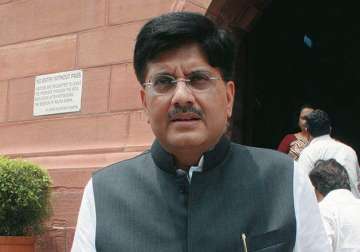New Delhi: Power Minister Piyush Goyal on Monday said the Centre cannot be considered as a bailout bank for helping debt-ridden power distribution companies and states will have to find a way out of the crisis.
"I had said to the states very loud and clear that the government of India cannot be considered as a bailout bank. The states would have to find the solution," Goyal said at a Fortune India event here.
The combined debt of power distribution companies (discoms) stands at over Rs 3 lakh crore. Faced with acute financial stress, many of these are unable to buy power.
He further said: "Some states have serious crisis (power) looming large. But at the end of the day, the government of India can only facilitate the turnaround of these discoms. And we cannot finance it."
On extension of the financial restructuring package (FRP), he said the government has not finalised any such extension of the old plan.
Originally introduced in April 2012, FRP was implemented in October 2013.
In an attempt to restore power purchasing capacity of the debt-heavy discoms and enable banks to recover their loans, the Cabinet Committee on Economic Affairs had approved the scheme for financial restructuring of state discoms in September 2012.
"FRP was not a very long-term sustainable proposition. It was finalised in March 2012 and implemented by October 2013 and by which time, nearly Rs 1 lakh crore of additional losses were accumulated. So, the entire plan became a non-starter," Goyal reasoned.
Under the plan, the discoms had to convert some short-term borrowings into long-term ones and create headroom for new ones.
Some promises were made (by the states) on loans, which were to be monitored, he added.
On ultra mega power projects (UMPPs), he said the Centre has finalised the bid document and is talking to the states on issues such as land and water.
"We will soon finalise the date (for floating tenders)," he added.
On coal supply, Goyal, who also holds the coal portfolio, said: "We have opened auction windows for big as well as small consumers whose requirement is like 200-400 tonnes."
